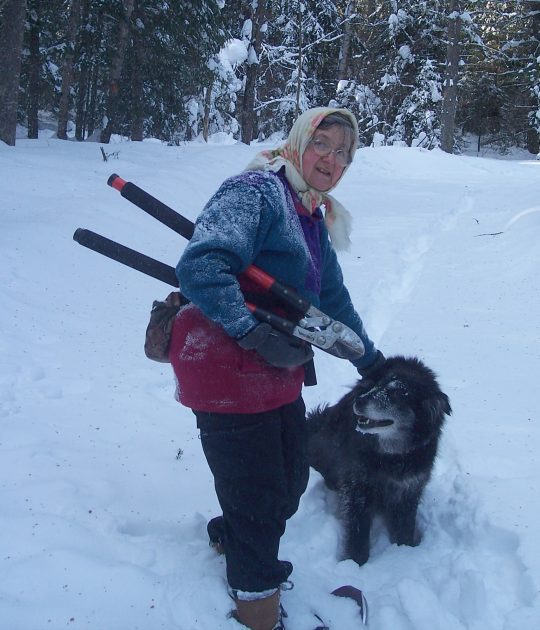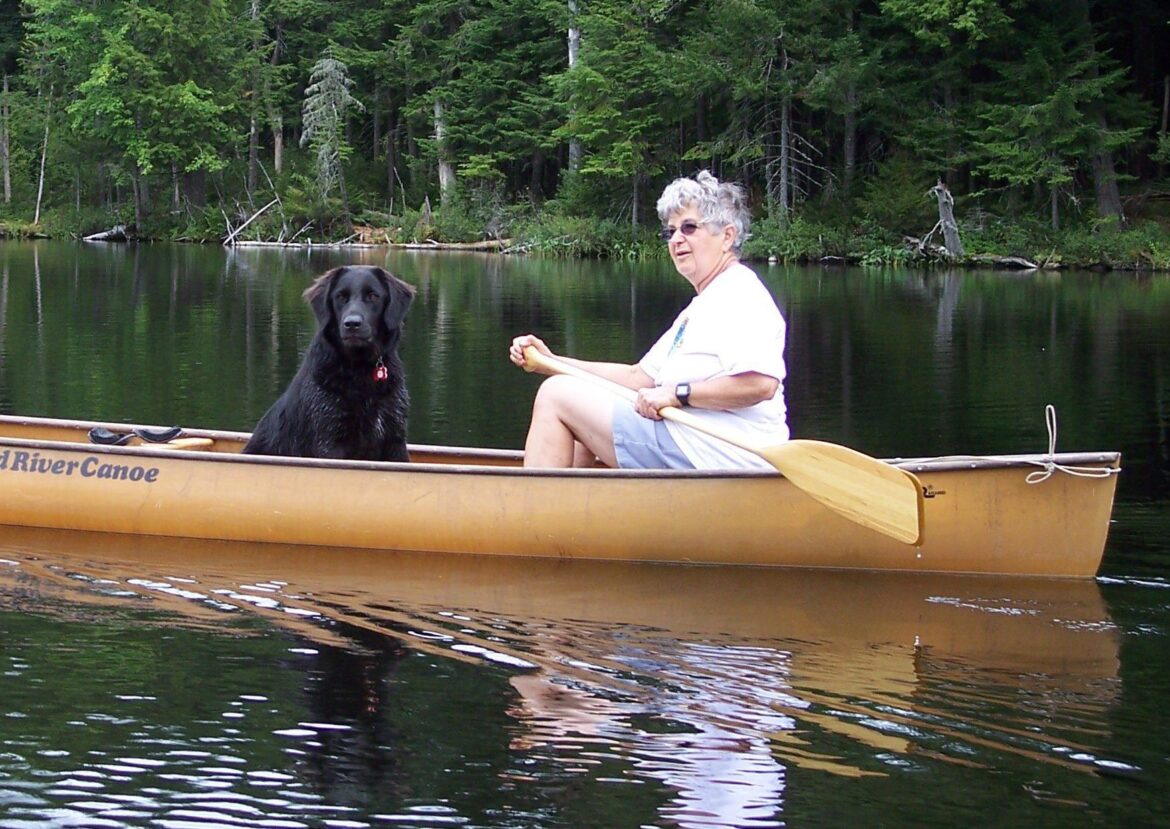
By Karen Davidson Seward and Nancy Sinkoff
We never really know the fullness of the lives of people we “know.” And so it is true with Dana Fast, a mainstay of the Lake Clear community who died on May 17, 2025, a chemist, a master gardener, a devoted mother, and a Holocaust survivor. Born in Warsaw, on March 30, 1931, as Lilka Miron to a bourgeois Jewish family thoroughly at home in Polish society, Lilka was a “pampered child,” according to her memoir, “My Nine Lives” (2011) and her testimony for the USC Shoah Foundation (1977).
That blissful childhood was shattered on September 1, 1939, when the Germans invaded Poland and entered Warsaw, home to the largest Jewish community in non-Communist Europe, and immediately implemented their antisemitic policies. Attempting to flee the German bombardments, Lilka, her brother Jurek, her mother Marja, and father Mieczyslaw, first thought to escape by train and then by horse carriage. Chaos, fear, and bombings made that impossible. The family returned to their apartment, reuniting with their devoted and loyal Christian Polish nanny, Janina.
In April 1940, an imprisoning wall to ghettoize the Jews of Warsaw started to be built, a clear sign that Lilka’s childhood would continue to crumble. Completed by October 1940, the Warsaw ghetto would ultimately incarcerate over 450,000 Jews. Lilka’s family was forced to move into progressively smaller, more congested spaces. Surrounded by death on the streets and deportations to Treblinka, Dana attended a secret school. She watched her formerly buoyant mother become almost immobilized with fear. The family survived on food smuggled into the ghetto or purchased on the black market.
August 1942. Imagine watching your father hand his last valuables to a smuggler to escort his two malnourished children out of the Ghetto and to the home of a relative on the “Aryan” side of the Wall. Then he turns to you to utter the last words you will ever hear him say. Something to the effect of: “Ditch this man before you get to your aunt’s house. Don’t let him see where you are going. Now, take your little brother’s hand and go.” And with that, you turn and get pushed into rows of Jewish slave laborers marching to work on the outside of the ghetto.
After being treated to a roll with ham and butter, a meal neither starving child would ever forget, Lilka spotted her nanny, Janina, at a bus stop. She bid the stranger goodbye, and slipped through an apartment gate with her little brother, as if it were her aunt’s home. When Lilka was sure the man had left, they scurried to Janina who accompanied the children to their rightful destination. Their aunt had married a Christian Pole and lived on Nowe Miasto (New City) street.
At that moment, Lilka Miron became Alicja Malaczynska, her first new name and identity. Dana survived the war years by denying her Jewish heritage. She lived as a Christian. She was a tough, resilient, and direct kid, even with the Gestapo. After some weeks, Dana and her brother moved to the home of a village teacher in Dabrowa. The man was kept in the dark about their true identity, only told that they were orphans, like so many other children victimized by the war. In 1943, the fear of German raids separated Dana and her brother. At an orphanage, fully immersed in Catholic religious life, Alicja was renamed Danuta (Dana) Wozniak.
After the war, miraculously reunited with her mother and brother (her father was killed shortly after her escape from the ghetto), she “resumed” daily life in Warsaw. A Polish teenager, she joined the Girl Scouts, excelled in school, and entered university to study chemistry like her father who had been a chemical engineer. There she met and married a journalist even though his Catholic mother was antisemitic. Dana took refuge in a secular life. Her daughter Yvona was born.
Dana was a gifted scientist. “Plastics, polymers, rubber, I was involved in creating this awful stuff,” she said many years later of the scientific innovations of her generation. She left her homeland permanently in 1962 after the “Polish October” also known as “The Thaw” after Stalin’s death. The small remaining Jewish community in Poland was allowed to emigrate to Israel.
In October 1962, Dana was reluctant to leave Poland, but now single, she wanted to rear her 7-year-old daughter closer to relatives who had settled in Israel. Upon arrival, she and Yvona registered with the U.S. Embassy to immigrate. Word on the street was that the waiting list for entry to America was five years due to annual quotas.
Two years later, miserable in a subtropical climate, Dana hurried the immigration process by marrying a psychiatrist named George Fast (a Polish Jew with his own harrowing story of parents who fled East and died of starvation). He found sponsors, his number came up, and they immigrated. Dana became a naturalized citizen of the United States in Syracuse in 1970. With a Green Card (and an affidavit that ensured she would get no public assistance), she was able to support her husband while he was re-accredited as a doctor.
Dana applied to work in a private chemical company in Chicago where being a woman was more problematic than being a Jew. She was told, “We don’t have bathrooms for women.” A University of Chicago medical lab hired her as a biochemical research assistant, a field that she grew to love. One of the first experiments she conducted in the lab was determining the consequences of feeding mice MSG. Their offspring were born blind. In local supermarkets she read food labels and learned how much MSG was in processed foods, including baby food. Her philosophy around eating local and organic food was seeded.

Dana Fast with pup, Fred.
An American friend and colleague at Upstate Medical Center in Syracuse introduced Dana to gardening. Their first effort was flowers, but eagerly Dana progressed to a small vegetable plot. By the time she moved to the Adirondacks for a job at the Trudeau Institute, she was serious about home-grown produce and farm-raised meats which reminded her of the mom-and-pop specialty stores of her Polish youth.

Dana Fast in her Master Gardening apron at a Pickling Workshop. Peas, carrots and fermenting cabbage into kraut, Local Living Venture, St. Lawrence County.
In the mid-1990s, Dana’s employer in Lake Placid, a non-profit research and education center for tissue culture (W.A. Jones Cell Science Center) was on shaky financial grounds and dissolved. Dana retired. For the remaining thirty years of her life, this independent, no-nonsense, outspoken dynamo contributed her skillsets to her Adirondack community. She applied her scientific mind to tracking garden data. She chronicled everything from seed starting to weather to the ripening of the first tomato.
“Dana’s work as a master gardener was exemplary, but her [personal] written records add even more value to that work,” Curt Stager, professor of natural sciences at Paul Smiths College, said about Dana’s handwritten journals.
Dana’s passion for growing one’s own food spilled over into the Adirondack Green Circle, Saranac Lake’s Village Improvement Society, Local Living Venture, and Common Ground Community Garden. She was a familiar face at the Cornell Cooperative Extension’s master gardener program information table at the farmers’ market, demonstrating how to press cabbage into sauerkraut, and so much more. She volunteered at the Paul Smiths VIC’s Butterfly House and native plant garden and took time out to become a 46er. Of course!

Farm 2 Fork prep in St. Luke’s kitchen. Pictured from left to right, Mary Lawthers, Amy Quinn, Yvona Fast, Dana Fast and Zoe Smith.
In June 2022, Dana, with her daughter Yvona, participated in a conversation, “Authors of the Jewish Diaspora,” at Lake Flower Landing in Saranac Lake, to celebrate the reissue of her memoir, retitled Good in the Midst of Evil: One Girl’s Survival of the Holocaust, reflecting Dana’s fundamental belief in humanity’s goodness.
At 91, her redoubtable, optimistic spirit was still evident despite Dana’s childhood experiences. Without the many kindnesses that were extended to her family during the horrifying years of World War II, and the serendipitous good luck she encountered, Dana may well have not survived being walled into an urban residential prison, hidden in closed-off rooms, renamed several times to camouflage her Jewish identity, and losing her beloved father.
A friend recently recalled how he was enthralled when his failing father, mere months before he died, sat down at a piano in the lobby of a Manhattan apartment building to play a gorgeous prelude by Chopin, the much-loved Polish composer, which the friend had never heard. Stunned, this friend remarked after his father died: “Everyone has within him a Chopin prelude.”
In her extraordinary life, Dana played many Chopin preludes, and we are so fortunate to have heard some of them.
Sources:
Dana Fast, My Nine Lives: A Memoir
USC Visual History Archive, Dana Fast
Interview with Jerry Miron
Photo at top: Dana Fast with pup, Spider. All photos provided by the authors.

